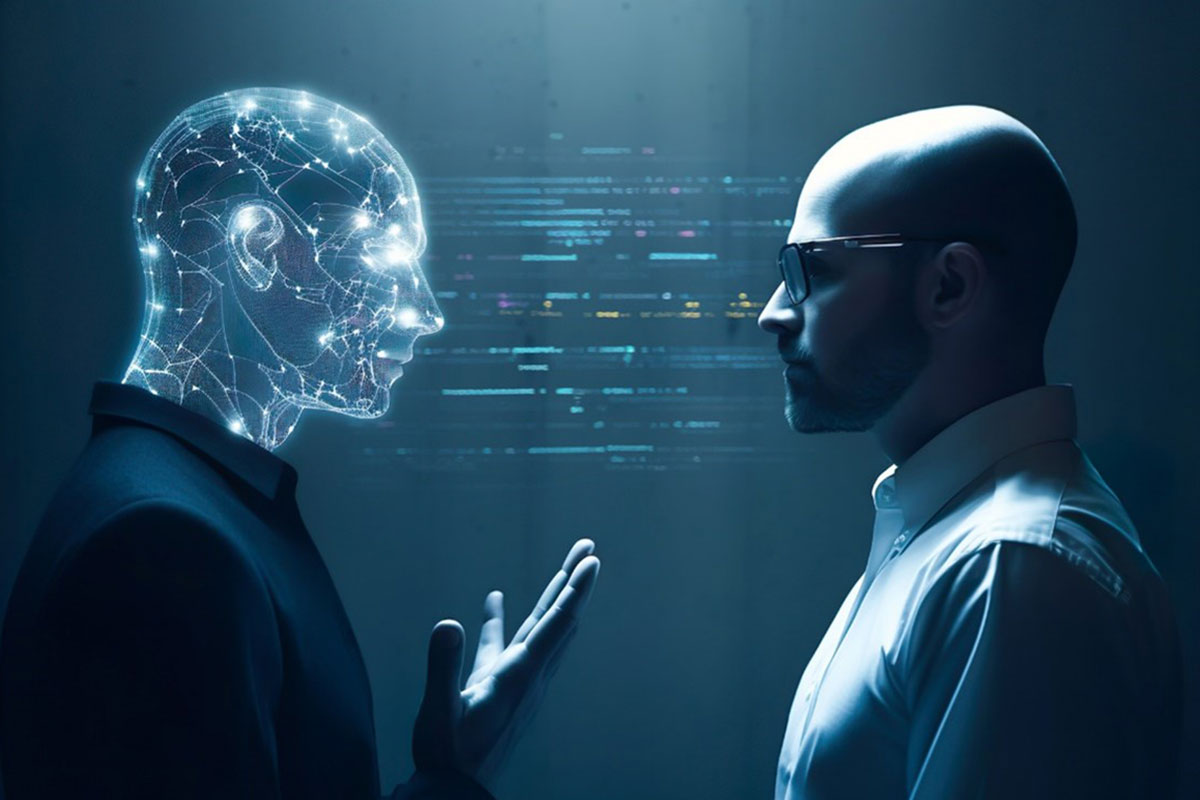The emergence of artificial intelligence (AI) has caused numerous debates, but one thing is certain – it is a powerful tool that has a huge potential to transform civilization.
In cultural contexts such as the one in Macedonia, mistrust of artificial intelligence seems counterproductive, hindering progress in a country struggling with an exodus of talent and socio-economic challenges.
Embracing AI technology is critical to keeping up with global advancements, improving learning capabilities, and democratizing access to expert knowledge. However, the responsible and ethical use of technology raises fundamental questions about what defines us as good (ethical) human beings.
As we move through this complex landscape, it becomes increasingly apparent that the perception of truth is subjective and vulnerable, with the particular challenge of distinguishing fact from fiction. It remains to be seen whether "resistance is futile!"?
AI will save Macedonia
AI is finally among us. Some people are afraid that AI will take their jobs or that it will destroy the world. But it would be better to think of AI as something that puts all of humanity's collective intelligence in the palm of our hands.
Think of it as our augmented intelligence that will allow us to be better than we are. Students, artists, doctors, scientists, city architects, statesmen... all will have a personal assistant, mentor, advisor, partner, therapist...
But it’s even more than that, especially in countries with a labor shortage and a deficit of experts, AI will enable them to thrive and rank among the world's economies. As part of a poor country struggling with the consequences of a mass exodus of talent and professionals, we must recognize the value of AI and the democratic power it brings.
Acceptance of AI is key to staying abreast of global developments, learning more easily, mastering tasks faster, to have easy access to highly qualified professional advice (from legal, medical, and university experts...) that is exclusive and unavailable to the majority.
Imagine, with AI even our politicians could make wise and expert decisions that benefit the entire country!
The hypocrisy of the statement - "I will not use unethical technology!"
Many individuals shun generative AI technologies on the grounds that they are unethical and pose copyright infringement. At the same time, they have no problem using other technologies originating from the military industry.
If we delve into it, all human technology is built on conquering foreign territories, imposing power, using someone else’s resources, getting rich on the backs of the weaker, and stepping over other people's skulls. There is an extensive list of technologies that have been developed for military purposes, due to the desire to conquer, with millions of victims.
 Source: europarl.europa.eu
Source: europarl.europa.eu
Examples include the internet (from Arpanet ), GPS, nuclear energy, numerous medical achievements, drones, meteorology and many others.
The interesting thing about generative AI technology is that it is not new. It is almost 100 years old, but only in this past year, with its new achievements, it managed to reach the general population.
What is responsible and ethical use of technology?
Technology can be used for good and for bad, but sometimes the line is not so clear-cut.
Fritz Haber, a German chemist and winner of the Nobel Prize for the so-called Haber-Bosch process. It is an industrial process of obtaining ammonia which is used for the production of fertilizers. It is estimated that one-third of annual global food production uses ammonia from the Haber–Bosch process and that this supports nearly half of the world's population. So Haber is undoubtedly a good man. On the other hand, Haber was a German nationalist and the father of chemical warfare.
He developed and used chlorine and Zyklon-B for military purposes, and as a consequence more than a million people were killed, and the use of chemical weapons was prohibited under customary international humanitarian law.
Haber is perhaps the most important scientist who ever existed, but was he a good or bad man, ethical or unethical?
A matter of perception
What is the truth and what is a lie in a world in which they are increasingly difficult to distinguish? AI will undoubtedly be used (and already is) for speading lies. DeSantis' latest ad for the US 2024 presidential elections campaign already includes AI-generated images. Many such examples will ensue.
But what is the truth? Again, it depends on the context and what you want to accomplish. If you want to write a recipe and use AI to generate it and the pictures of the "cooked" dish, is that lying? Of course. You have not gone through the process of making the dish. And what if you try the recipe and it's good? Several such recipes have already been published on Arno 's website as an experiment. What if, on the other hand, you copy the recipe from another person or website and post it, which is common on cooking portals, will that be considered lying?
Things are not as simple as they seem. Our perception is a fragile thing. We often believe in things that do not exist. In Macedonia, the conspiracy theory movement has considerable momentum.
At the same time, the most common are the theories about the harmfulness of vaccines, the so-called the anti-vaxx movement, the flat Earth theory, chemtrails, climate change denial, the dangers of the 5G network, various Covid-19 conspiracy theories, etc.
Indeed, in a world of lies, the truth is hard to discern, but it is even harder to see it in an age of fear. AI undoubtedly causes fear in people. They fear for their own livelihoods, like for instance creatives and intellectuals, or for the survival of the human species, due to the danger of the singularity, the moment when AI will be autonomous and independent of humans.
Questions about truth and the perception of reality have always peaked philosophers’ interests. From the Discourse on the Method (1637) by René Descartes, to the Irish empiricist philosopher George Berkeley, through Kant's philosophy and his Critique of Pure Reason (1781) to Jean Baudrillard 's Simulacra and Simulation (1981) and the modern movies like The Matrix, philosophers and intellectuals, all contemplated the nature of cognition and reality.
The question is how AI will shape our perception of reality, ethics and truth. It can be an undemocratic and destructive force, but it can also be a powerful tool for the underprivileged and the powerless to rise from the dust of poverty and ignorance. To paraphrase Karl Marx, AI has the power to put the means of production back into the hands of all of the people in the world!
Responsible use of technology
As we navigate the complex landscape of technological progress, it is essential to consider the responsible and ethical use of AI. While some individuals criticize generative AI technologies, citing concerns about ethics and copyright infringement, it is important to recognize that many technologies we use today, including those originating from the military industry, have complex ethical implications.
Responsible use of technology lies not only in assessing its potential for good or bad, but also in understanding the intentions and broader consequences associated with its use.
If we manage to overcome those obstacles, we will understand that AI is a piece of technology like any other. Sometimes unfair and undemocratic, but always accessible to all. It can be used to spread misinformation, but it can also enable democratization and access to information and services that weren’t available ever before, and what is most important – to everyone and everywhere!
For a country like Macedonia, that is of essential, if not vital, importance.
Please refer to the Terms before commenting and republishing the content. Note: The views and opinions expressed in this article are those of the author and do not necessarily reflect the views of the Institute of Communication Studies or the donor.


